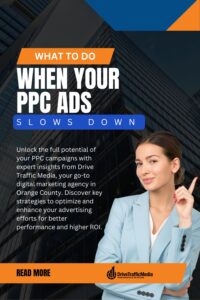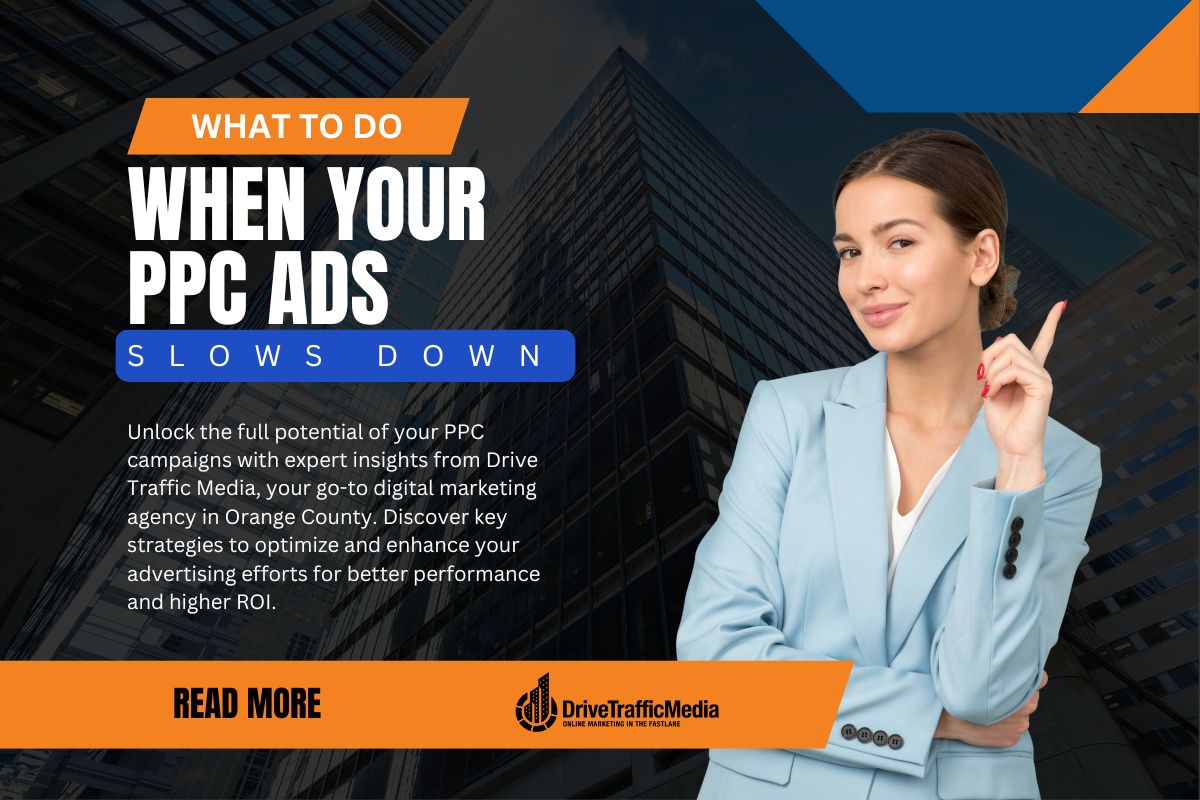Pay-per-click (PPC) advertising is a powerful tool for driving traffic, generating leads, and boosting sales. However, it can be frustrating when your campaigns start to slow down and you’re not seeing the desired results. If your PPC advertising is going slow, don’t panic. Drive Traffic Media offers crucial steps to analyze and revitalize your campaigns to ensure they perform optimally.
Conduct a Comprehensive Audit
Conducting a thorough audit is the first step in diagnosing a slow PPC campaign. This involves reviewing all aspects of your campaign, including keywords, ad copy, landing pages, and targeting settings. Here’s how to go about it:
- Keyword Analysis: Review your keyword list and identify any underperforming keywords. Are they relevant to your target audience? Are you using too many broad-match keywords that might be attracting unqualified traffic? Consider refining your keyword list by focusing on long-tail keywords, which often have lower competition and higher conversion rates.
- Ad Copy Review: Your ad copy is crucial in attracting clicks. If your ads aren’t resonating with your audience, consider revisiting your headlines and descriptions. Are they compelling and relevant? Test different versions of your ads (A/B testing) to see which ones perform better.
- Landing Page Optimization: Even if your ads generate clicks, a poorly optimized landing page can result in low conversions. Ensure your landing pages are user-friendly, load swiftly, and provide a clear call to action. The content on the landing page should preferably closely match the ad that leads to it.
- Targeting Settings: Review your targeting settings, including location, device, and audience demographics. Are you reaching the right people? Adjust your settings to better align with your target market.

Analyze Performance Metrics
Understanding your PPC performance metrics is critical to identifying where your campaign might go wrong. Key metrics to focus on include:
- Click-Through Rate (CTR): A low CTR may indicate that your ads aren’t compelling enough or are being shown to the wrong audience. Improving ad relevance and quality can boost CTR.
- Quality Score: This metric is used by platforms like Google Ads to measure the relevance of your keywords and ads. A low-quality score can increase your cost per click (CPC) and lower your ad’s visibility. Improve your Quality Score by refining your keywords, ad copy, and landing pages.
- Conversion Rate: If you get clicks but few conversions, there might be an issue with your landing page or the offer. Consider testing different landing page designs, offers, and calls to action to improve conversions.
- Cost Per Acquisition (CPA): A high CPA means spending too much for each conversion. This could be due to high CPC or low conversion rates. Optimize your campaign to reduce costs and increase efficiency.
Refine Your Budget and Bidding Strategy
Your budget and bidding strategy can significantly impact your PPC campaign’s performance. If your campaign is slowing down, consider the following:
- Budget Allocation: Review how your budget is allocated across campaigns and ad groups. Are you spending too much on underperforming keywords? Consider reallocating your budget to higher-performing keywords and campaigns.
- Bidding Strategy: Are you using the right bidding strategy? Manual CPC, Enhanced CPC, Target CPA, and Target ROAS are just a few options. Test different strategies to see which one works best for your goals.
- Ad Scheduling: Analyze the times and days when your ads perform best. Increase your bids during peak hours or days and decrease them during slower periods.
Stay Updated with Industry Trends
The digital advertising landscape is constantly evolving. Stay updated with the latest trends and best practices in PPC advertising. Changes in algorithms, new features, and emerging tools can impact your campaign’s performance. Regularly educating yourself and adapting to these changes can help keep your PPC campaigns competitive.
Test, Optimize, and Repeat
PPC advertising is not a set-it-and-forget-it strategy. Continuous testing and optimization are crucial for success. Regularly test different aspects of your campaigns, such as ad copy, keywords, bidding strategies, and landing pages. Use the insights gained from these tests to make informed decisions and improve your campaign’s performance.
Conclusion
If your PPC advertising is going slow, it’s essential to take a proactive approach. By conducting a thorough audit, analyzing performance metrics, refining your budget and bidding strategy, staying updated with industry trends, and continuously testing and optimizing, you can breathe new life into your campaigns and achieve better results. Remember, patience and persistence are key—PPC success doesn’t happen overnight, but with the right strategies, you can turn things around and reach your goals. Drive Traffic Media, your trusted digital marketing agency in Orange County, is here to help you deal with these complexities and achieve robust PPC results.
